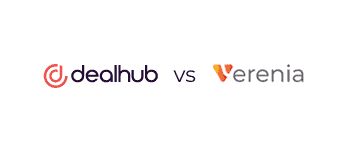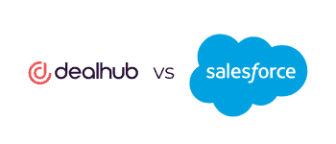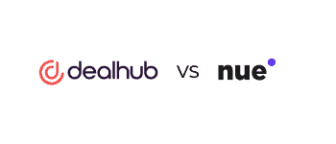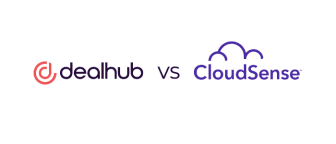Introduction
Compare DealHub CPQ vs. Verenia CPQ
Think of CPQ as a virtual sales assistant. It guides sales teams through quoting, proposal generation, and contract management. CPQ solutions like DealHub CPQ and Verenia CPQ automate the configure-price-quote process, reducing quoting errors and helping sales teams close deals faster.
DealHub is a unified quote-to-revenue solution for sales teams. It provides pricing guidance, approval workflows, and accelerated contract negotiations. It also includes contract management, document generation, subscription billing, e-signature, and CRM integrations for a complete sales solution.
In addition to DealHub’s integration library and features, it also offers an API library that can be used to integrate with third-party applications. This makes DealHub an ideal solution for companies working with multiple systems or those looking for advanced customization of their sales stack.
Verenia CPQ is built for product configuration and quoting in the manufacturing industry. Its primary differentiating features include CAD automation and 3D product visualization. It also provides guided selling features, dynamic pricing rules, proposal generation tools, and different user orientations for manufacturing, wholesale, and retail.
Verenia naturally works well with Oracle, another prominent player in the manufacturing space. The company created a CPQ specifically for NetSuite, which was purchased by Oracle and is now sold under the Oracle name.
Product Overview
Overview of each CPQ Solution
DealHub and Verenia both offer comprehensive CPQ solutions, but their approaches differ in numerous ways—from the end-user experience to their specialized features.
Defining DealHub CPQ
DealHub CPQ is a modern sales and revenue management platform that includes CPQ, contract lifecycle management (CLM), a digital sales engagement platform (DealRoom), and billing software that handles subscription management, invoicing, and billing for all pricing models.
At its core, DealHub is a SaaS platform built for SaaS companies. The platform helps sales teams create, configure, and accurately manage customer quotes. It simplifies the manual process of requesting product information, gathering customer data, and sending out accurate proposals—essential features for software companies with complex enterprise sales cycles.
For other industries, DealHub’s core features are also helpful. The platform offers guided selling, automated quoting and proposal generation, real-time pricing rules, and a library of integrations with no-code customization. And with its sales engagement add-on, communication is fast, centralized, and trackable.
Defining Verenia CPQ
Verenia CPQ is an enterprise-grade software manufacturers, wholesalers, and retailers use to manage the quoting process. It’s tailored for companies with product lines that require complexity and customization.
Verenia provides advanced features like CAD automation, 3D product visualization, and guided selling recommendations. It also includes built-in B2B ecommerce capabilities that streamline the online purchasing process, automated pricing rules, proposal generation, contract management, and a CRM product that is sold separately. It works in conjunction with all online shopping cart solutions to ensure vendors can connect with their buyers over the web with minimal back-and-forth.
Unlike DealHub, which primarily targets tech companies, Verenia’s features won’t be as helpful for organizations that don’t sell complicated physical products or process high-volume purchase orders on a daily basis.
Product Features
Comparison of Key Features
When looking into the actual product, DealHub and Verenia are different software products, on the surface and at their core. They offer different features that are tailored to the needs of their specific ICP.
DealHub is the perfect solution for subscription businesses like those that sell complex software. Software companies with microservices and multiple subscriptions benefit significantly from its automated quotes, real-time pricing rules, and ability to manage billing, configuration, and revenue management for any pricing model.
For products-based businesses, DealHub is also an excellent solution. By streamlining the contract negotiation process, quickly generating invoices for buyers, and managing the entire contract lifecycle in one platform, it offers an efficient way to manage complex projects for many other types of customers.
Verenia is an omnichannel sales enablement suite for manufacturers and B2B ecommerce sellers. It’s designed to handle complex and customized products, so it provides features like CAD automation, 3D product visualization, guided selling recommendations, and automated pricing rules.
With Verenia CPQ’s user-friendly interface, product teams can execute all their sales activities from anywhere with any device—desktop, laptop, tablet, or smartphone. It also enables managerial staff to edit product data and adjust pricing for optimum results.
Here’s a breakdown of each product’s features:
| DealHub CPQ | Verenia CPQ |
|---|---|
| A centralized revenue management platform including quote-to-cash, billing, subscription management, and sales engagement insights. | Configure complex physical product combinations for B2B ecommerce and enterprise buyers. |
| Integration for connecting with third-party software, including Freshworks CRM, Microsoft Dynamics 365, HubSpot, accounting software, DocuSign, and ERP systems. | Native integration with all popular ERP and CRM systems, including NetSuite, Epicor, Syspro, Microsoft Dynamics, and Salesforce |
| Fast integration and setup within weeks with no code required. | IT implementation may take longer for large businesses with many products, parts, and manufacturing facilities. |
| Guided selling flows make it easy for reps to create proposals and quotes with all data synced to the company’s CRM. | Salesforce offers pre-built guided selling capabilities, but more intricate workflows may require custom coding. |
| Readily scalable for sales team growth and expansion. | Scalable and integration-ready with enterprise ERP solutions. |
| With DealRoom, digital proposals are sent via attachable files or links, meaning only one point of interaction is necessary to complete the entire sales process. | Fast quote and proposal generation for ecommerce buyers, plus unique features for customer use. |
| Contract management, e-sign, document generation, and multi-dimensional pricing models out-of-the-box. | Unique features for different job types (engineering, sales/customer success, operations, C-suite). |
| Predictive sales playbooks help sales reps move buyers through the sales process more quickly. | Automated CAD drawing helps suppliers configure products for buyers without the need for complicated mockups and third-party visualizers. |
| Subscription, renewal, and order management capabilities with rules-based quoting for complex sales. | Complex billing capacity plus support for all major ecommerce shopping carts. |
| Buyer engagement insights that help sales reps improve future sales engagements. | Detailed reporting analytics for customized pricing strategies and discount structures. |
| Automated approval workflows for faster turnaround times. | Full-cycle quote-to-cash automation for wholesalers, retailers, and manufacturers. |
| Cross-functional collaboration for quoting processes with audit trails. | Create custom 3D visualizations and send product renderings to buyers in seconds. |
| Web-based platform. | Web and mobile (iPhone and Android) platforms. |
| Phone, mobile, and online customer support Knowledge base Training and enablement from DealHub experts | Phone and mobile support Additional support for Oracle customers |
Customer Size
Ideal Customer Profiles
Understanding the size and type of customers each of these platforms is best for can help determine the right choice for an organization.
DealHub targets small to large businesses looking to automate their sales process, focusing on software companies. It’s ideal for busy sales teams that need maximum efficiency when handling customer requests and finding new leads.
Verenia CPQ works for companies of all sizes, but its features best serve companies in the enterprise sector, which many B2B product vendors, wholesalers, and retailers are. With more complex products and customization options, Verenia CPQ is perfect for customers that need 3D digital asset management and enterprise tools that come with a larger support package.
It is worth nothing that Verenia’s CPQ software requires a ten-seat minimum, so companies with fewer than ten employees that need to use the software should look elsewhere. For example, even a mid-sized company with 60 employees might only have five sales reps who need to use the software, so Verenia is best suited for larger organizations.
Customer Support
Support Features & Resources for Each Solution
Support is an essential element of any CPQ platform, especially considering the difficulty of companywide implementation.
DealHub’s implementation and enablement specialists provide technical help and advice to ensure customers get the most out of their software by onboarding, integrating with existing systems, and training users. The company’s ongoing support is also best-in-class, with 24/7 customer support and dedicated customer success managers available to answer questions.
Verenia CPQ also offers reliable customer support through its onsite team of experts who provide the necessary system integration and support to ensure customers get the most out of their software. Verenia’s customer success team is available 24/7 to answer queries and troubleshoot any issues that arise.
As an Oracle company (in part), Verenia also has more support options for Oracle customers through its customer portals.
Pricing
Breakdown of Pricing Options
Both DealHub and Verenia offer quote-based pricing, so prospective customers need to contact sales if they want to know more about the specific costs.
DealHub’s pricing model is flexible and can be tailored to meet a customer’s needs, with both annual contracts and pay-as-you-go subscription plans available.
Verenia CPQ also offers robust scalability for customers who need to grow their businesses. Its pricing is based on the number of users, but its lack of microservice offerings makes pricing relatively straightforward (even on a quote basis).
| DealHub CPQ | Verenia CPQ | |
|---|---|---|
| Product Pricing | Contact sales | Contact sales |
| Implementation Fees | One-time implementation fee | One-time implementation fee |
| Additional Licenses | No additional license fees | No additional license fees |
To use either platform to their fullest extent, external IT consulting or resource costs may be incurred further down the line. But unlike some systems (e.g., Salesforce CPQ), implementation costs are generally kept to a minimum.
Summary
Considerations for Choosing Between the Two Solutions
DealHub CPQ and Verenia CPQ are two high-performing CPQ software products in their own regard. With access to features such as product modeling, guided selling, and pricing rules, these CPQ solutions can help businesses automate their sales process.
Both DealHub and Verenia offer excellent customer support options, but they differ in terms of target customers, scalability, and pricing.
DealHub is best for tech companies whose sales reps can benefit from guided selling playbooks, advanced sales enablement tools, and subscription quote generation geared towards microservices- and quote-based SaaS products.
Verenia is only meant for medium to large companies with enough users to satisfy the user requirement and complex physical products requiring 3D digital asset management and enterprise-level support.
FAQs
Frequently Asked Questions
Oracle purchased Verenia’s NetSuite CPQ and now uses it as its own (Oracle CPQ). The transaction took place on January 4, 2022, at an undisclosed valuation.
The main difference between DealHub and Verenia CPQ is their target customers. Although DealHub serves numerous different customer verticals, it is best for tech companies selling SaaS products, while Verenia is better suited to larger organizations with complex physical products that need 3D digital asset management and enterprise-level support.
In terms of pricing, both solutions offer quote-based pricing models. However, DealHub also has flexible annual contracts and pay-as-you-go subscription plans available to customers. Verenia’s pricing is based primarily on the number of users and is considered high for the CPQ software industry.
Verenia is a total omnichannel and sales enablement solution that includes CPQ, B2B Ecommerce, and a sales CRM (as a separate product). It has features like 3D digital asset management and guided selling, making it ideal for companies selling multiple products, parts, or custom configurations. It also has a powerful customer success team and is backed by Oracle, so it comes with additional support options for Oracle customers.
CPQ software revolutionizes the quoting process, allowing sales teams to provide quotes in a fraction of the time. This is thanks to customizable rules and automated pricing that can be easily tailored for one-off sales, subscription models, recurring billing arrangements, and software-driven guided selling abilities.
DealRoom is a digital sales room, a centralized space where sales reps can manage deals, quotes, and customer information. It includes data-driven insights and recommendations to help guide reps toward a sale. It also offers automated approval workflows and a communication platform, speeding up the sales process. DealRoom also automates some of the most time-consuming tasks for sales teams, like quote generation.
Although each CPQ software is part of the same industry, none of the three are the same. Salesforce CPQ has a more intricate set of features, including custom coding for just about anything. This makes it better suited for large organizations, as the cost of scaling with Salesforce is much greater. It also integrates with other Salesforce products, giving it an edge in terms of its product suite.
DealHub and Verenia are more specialized and technologically advanced in their own regard, making them the best options for their respective industries.

Rhonda Bavaro excels in boosting SaaS companies’ growth through innovative content marketing, thriving in the dynamic sales tech industry amidst evolving technologies that drive revenue acceleration.








